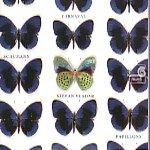Here’s a trick. Play certain sections of contemporary pianist Stefan Vladar’s Schumann Papillons against the great Romantic pianist Alfred Cortot’s 1935 account. Try to guess who sounds “Modern” and who sounds “Romantic”. You’ll be surprised when Cortot’s steadier tempos and more direct expression fall into the Modern camp, while Vladar’s freer approach to phrasing and rhythm bear Romantic connotations. As it happens, Vladar’s interpretation unsettlingly veers back and forth between scrupulous and capricious, sometimes within the same short movement. For example, in No. 8’s first eight measures Vladar is one of the few pianists to bring out the cross-rhythmic effects by carefully observing the composer’s staccato and legato directives. However, Vladar monkeys around with the next eight measures’ basic pulse to the point where he forgets to observe Schumann’s dynamic swells and specifically accented upbeats. The poco ritenuto over measures 17 through 24 is replaced by a shapeless, cloying ritard.
Similarly, Vladar’s unspecified accelerandos in No. 11 are more excitable than exciting, and they trivialize how the composer so deliciously displaces accents and phrases against his basic polonaise pulse. I’ve heard more magical and masterfully timed renditions of the Finale’s long pedal effects and puckish coda (Kempff and, of course, Cortot), but No. 2’s repetitions easily absorb Vladar’s fanciful rubatos as well as his taking the unwritten yet “traditional” B-flat melody note on the downbeat of measure nine, second time around.
Vladar’s Carnaval also leaves mixed impressions. Much of his fast playing is brusque and loosely defined (the Préambule and Pause), or just plain hammered out (here Pantalon et Colombine should have been retitled Itchy and Scratchy!). Yet other movements find Vladar’s poetic potential in full bloom: he uncovers lovely left-hand inner voices in the repeats of Eusebius and adheres to the once-common practice of interpreting the Chopin movement lyrically, as opposed to the Agitato that Schumann requests. In short, you’ll find much more charm, warmth, variety of character, and narrative sweep via Freire (Decca), Lifschitz (Palexa), Rubinstein (RCA), Arrau (Philips), and Lazaridis (Somm).
Faschingsschwank aus Wien fares better on the whole. Vladar gives individual voice to the opening Allegro’s sub-sections, exploiting the composer’s linear interplay with imaginative acuity. I especially like the dignified reserve and almost Mozartean purity Vladar brings to the Romanze, plus his sharply-sprung dotted rhythms in the Scherzino. Perhaps the Intermezzo is a shade driven and hard-nosed for its lyrical line to fully soar, but the Finale’s rapid-transit tempo leaves little room for clear articulation and punctuation, notwithstanding Vladar’s pistol-whipping finger technique. I miss the solidity and poise that keep Richter (EMI), Michelangeli (DG), and the underrated Ciccolini (Cascavalle) at the head of my Faschingsschwank aus Wien short list. No doubt that Vladar’s Schumann holds much to admire and respect, but given the pianist’s capabilities, this disc could have been better.
































